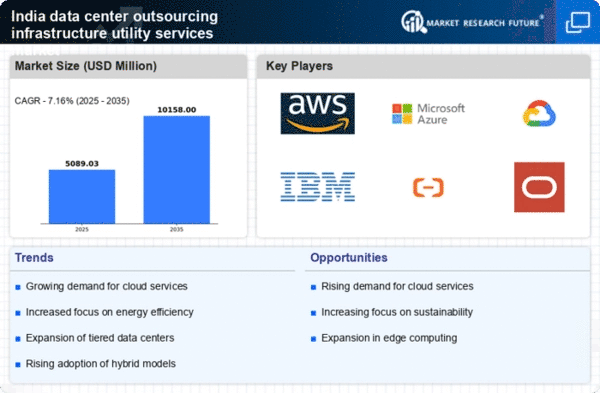Growing Cloud Adoption
The increasing adoption of cloud computing in India is a pivotal driver for the data center-outsourcing-infrastructure-utility-services market. As businesses transition to cloud-based solutions, the demand for data centers that can support these services rises. Reports indicate that the cloud services market in India is projected to reach $10 billion by 2025, reflecting a compound annual growth rate (CAGR) of approximately 30%. This shift necessitates robust data center infrastructure, leading to outsourcing opportunities for companies seeking to enhance their operational efficiency. Consequently, the data center-outsourcing-infrastructure-utility-services market is likely to experience substantial growth as organizations prioritize scalable and flexible solutions to meet their evolving needs.
Focus on Cost Optimization
Cost optimization remains a critical driver for the data center-outsourcing-infrastructure-utility-services market in India. Organizations are increasingly seeking ways to reduce operational expenses while maintaining high service levels. Outsourcing data center operations allows companies to leverage the expertise of specialized providers, often resulting in lower capital expenditures and operational costs. According to industry estimates, businesses can save up to 30% on IT infrastructure costs by outsourcing. This financial incentive is likely to propel the growth of the data center-outsourcing-infrastructure-utility-services market as more companies recognize the benefits of outsourcing their infrastructure needs.
Rising Internet Penetration
The rapid increase in internet penetration across India is significantly influencing the data center-outsourcing-infrastructure-utility-services market. With over 700 million internet users as of 2025, the demand for digital services is escalating. This surge in connectivity drives the need for enhanced data center capabilities to support online applications, e-commerce, and digital content delivery. As businesses seek to capitalize on this growing user base, they are likely to outsource their data center needs to ensure scalability and reliability. Consequently, the data center-outsourcing-infrastructure-utility-services market is poised for expansion as organizations adapt to the digital landscape.
Regulatory Compliance and Data Security
In India, stringent regulatory frameworks regarding data protection and privacy are driving the data center-outsourcing-infrastructure-utility-services market. The implementation of laws such as the Information Technology Act and the proposed Personal Data Protection Bill necessitates that organizations ensure compliance with data security standards. This regulatory landscape compels businesses to invest in secure data center solutions, often leading to outsourcing arrangements with specialized providers. As companies strive to mitigate risks associated with data breaches, the demand for compliant and secure data center services is expected to surge, thereby bolstering the market's growth trajectory.
Technological Advancements in Infrastructure
Technological advancements in data center infrastructure are driving innovation within the data center-outsourcing-infrastructure-utility-services market. The emergence of advanced technologies such as artificial intelligence, machine learning, and automation is transforming how data centers operate. These innovations enhance efficiency, reduce energy consumption, and improve service delivery. As Indian companies increasingly adopt these technologies, the demand for modernized data center solutions is expected to rise. This trend may lead to a greater reliance on outsourcing as organizations seek to integrate cutting-edge technologies without incurring substantial upfront investments, thereby fostering growth in the data center-outsourcing-infrastructure-utility-services market.
















